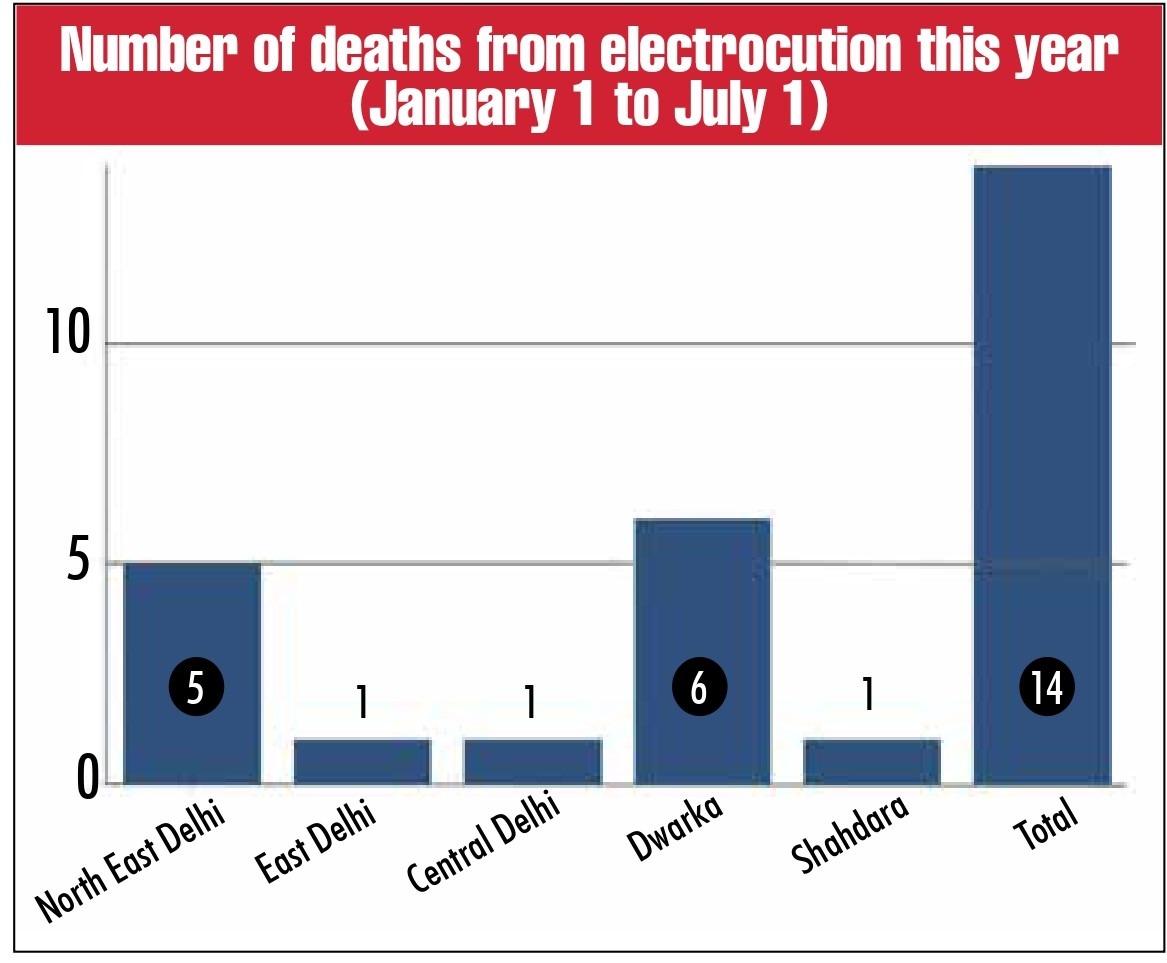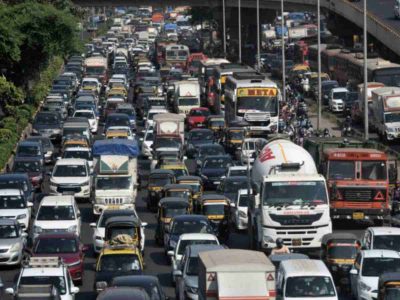Loose wires and waterlogged streets are always a recipe for disaster in rainy season. With water conducting electricity with ease, many electrocution incidents have been noted in the national capital this year.
Although chances of dying from electrocution are very low, the number of fatalities in the Capital have already crossed double digits this year. According to data from Delhi Police, North East Delhi has recorded five such deaths, East Delhi one, Central one, Dwarka six, whereas Shahdara reported one instance.
The numbers signify deaths which could have been easily avoided if only civic authorities such as the Delhi Development Authority, the Municipal Corporation of Delhi and the government would have pulled up their socks.
These deaths were caused due to scenarios such as unauthorised cable installations, illegal extensions from electrical networks, substandard internal wiring, kite flying, power theft, unsafe storage practices near electrical equipment, overloading of electrical systems and loose wires coming in contact with pools of water, according to a report by power distribution companies.
The death of a civil services aspirant in Patel Nagar on July 22 this year caused a furore. He was stuck to a gate as electricity passed through his entire body leaving him dead. His corpse remained stuck to the gate he had contacted initially.
Two other incidents shocked officials in Dwarka as one included a Bombay Suburban Electric Supply (BSES) employee who breathed his last while fixing an electric pole at Mohan Garden.
The deceased, identified as Ram Naval, had died of the electrocution followed by a 15-feet fall from the pole on July 14, according to officials.
A 12-year-old boy, identified as Mudit Kumar, died as he went towards a waterlogged site in the DDA colony at Bindaur, on July 31. Kumar was electrocuted due to two open wires coming in direct contact with water, according to the police.
A similar incident was reported on August 1 from south Delhi’s Sangam Vihar, where a rag picker, Anil, succumbed to death after suffering a fatal shock near his house, when he was on his way to get groceries.
Six people died during the continuously heavy rainfall of July 31 and August 1. Three of them died of electrocution (two from live wires), while two drowned to death and another was victim of a house collapse.
Reportedly, from January, 2023 till July 1 this year, there have been 50 incidents of electrocution in the national capital which have resulted in the death of 26 people.
 Police have stated that these incidents could have easily been avoided and puts an unneeded stress on them.
Police have stated that these incidents could have easily been avoided and puts an unneeded stress on them.
“It would have been much simpler for us if the civic authorities such as Delhi Development Authority (DDA), Public Works Department (PWD) started working and supervising such incidents. It is not that difficult to reduce the death toll in these cases,” said a senior police official from Dwarka district.
According to Ankit Singh, the Deputy Commissioner of Police, Dwarka, these incidents mostly happen in areas such as Najafgarh and Uttam Nagar.
“These deaths have mostly been recorded in Najafgarh, Uttam Nagar, Davdi and Bindapur localities,” he said.
In an incident in Mayur Vihar, a person identified as Ashok died while he was putting up a tent at OCS Apartment’s park when he was allegedly electrocuted, on June 26.
According to officials, the deceased was declared dead when he was brought to the hospital, and an FIR was registered against Hetram, the person who had employed him.
The FIR filed by Deepak, another labourer, reads, “Ashok was possibly electrocuted when he was trying to tie the tent around an electric pole.”
A senior police official in the East district highlighted that this happened due to poor earthing in the pole. Moreover, he highlighted that the civic authorities had been warned multiple times to maintain regular checks and balances over the functioning of such wires and to fix the drainage systems so that there is no chance of water getting logged in these areas.
Similarly, a 34-year-old woman identified as Poonam succumbed to death in North East Delhi as she tried wading through a waterlogged street at Bhajanpura, to get her weekly groceries.
According to officials, current from a live wire in water resulted in her demise.
According to the report by power distribution companies, cases of electrocution are mostly common in the following areas — Sangam Vihar, Batla House in Jamia, Abul Fazal Enclave, Hauz Rani, Badarpur, Shaheen Bagh, Chhatarpur and Mahipalpur in south Delhi; Bhajanpura, Mukherjee Nagar, Budh Vihar, Mangolpuri, Bawana, Pooth Village, Kirari and Azadpur in north Delhi.
Similarly, most complaints in west Delhi come from Uttam Nagar, Najafgarh, Nihal Vihar, Khyala, Kailashpuri, Manglapuri, and in northeast Delhi from Sonia Vihar, Mustafabad, Shiv Vihar and Shriram Colony. In east Delhi, the problem areas are New Ashok Nagar, Mayur Vihar Phase III and Trilokpuri.
Also Read: Delhi: Clogged city drains leave the Capital flooded
Two separate incidents had occurred on July 8 in 2023 in east Delhi, when two workers died due to criminal negligence on their employer’s end.
In one instance, 28-year-old Mahipat was working at a sweet shop in Shakarpur where the workers had to wade through waterlogged floors with live wires strewn about.
Mahipat pushed his luck too far and that resulted in his death. Although all of the workers had highlighted their concerns to their employer, Rakesh Guma, no action was taken.
Kunwar Singh, a colleague of the deceased and the person who had filed the FIR, said that the civic authorities had never come to check upon the conditions they were working in.
“It is obvious to say that the conditions we were working in were not habitable at all but if the civic authorities let them function like this, then they will. He (Guma) only wanted to maximise his profits and nothing else. If nobody even surveys them or checks if they have everything working according to the law, it is obvious that they will not care about their employees. It is only because of the relaxed attitude of the MCD and others that these shops are working with such impunity,” he said.
On the same day, an employee at a cafe in Preet Vihar, died while coming in contact with the geyser board while washing utensils.
The National Human Rights Commission has taken suo-motu cognisance of the unnatural deaths caused due to rain on July 31 and August 1 in the national capital and highlighted that these were a case of “negligence by civic authorities, which is a matter of concern”.
The statement was made on August 3. However, none of the civic authorities have pulled up their socks yet as blame game regarding the responsibility has ensued between the MCD and the DDA.





